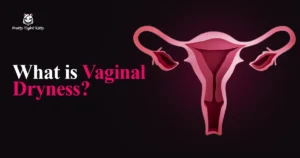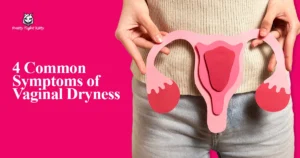 Embrace Change: The Journey to Vaginal Rejuvenation
Embrace Change: The Journey to Vaginal RejuvenationAt Pretty Tight Kitty, we understand the importance of embracing change, especially when it comes to personal wellness and confidence. That’s why we’re dedicated to…
Read Article
Ever experienced dryness down there? It’s more common than you might think. But do you really know what it means, or how it could be quietly affecting your vaginal health?
Well just think you’re going about your day, and suddenly, you notice discomfort or irritation in your intimate area. Maybe it’s during intimacy, or simply while going about your daily routine. It’s a feeling of dryness that just won’t go away, leaving you feeling uncomfortable and out of sorts.
You’re not alone!
Many women experience vaginal dryness at some point in their lives, but understanding its causes and effects is key to finding relief and reclaiming your comfort.
So let’s dive into this often-overlooked topic.
Vaginal dryness, medically known as vaginal atrophy or atrophic vaginitis, is a condition characterized by a lack of moisture and lubrication in the vaginal area. It occurs when the natural lubrication produced by the vagina decreases, leading to discomfort, irritation, and sometimes pain during activities such as sexual intercourse.

Vaginal dryness can affect women of any age, but it is most commonly experienced during menopause due to hormonal changes.
However, it can also occur during other life stages, such as childbirth, breastfeeding, or while taking certain medications.
Its important to address it – why?
Not only for comfort but for your vaginal health and overall well-being. Ignoring symptoms or dismissing them as a normal part of aging can lead to complications and affect quality of life.
Vaginal dryness, a common concern among women, can be attributed to various factors, both hormonal and non-hormonal. Understanding the underlying causes is essential for effectively treating this condition.
The most common cause of vaginal dryness is hormonal fluctuations, particularly a decrease in estrogen levels.
Estrogen plays a crucial role in maintaining the health and function of the vaginal tissues by stimulating the production of vaginal mucus and maintaining the thickness of the vaginal lining. During menopause, estrogen levels decline significantly, leading to a decrease in vaginal moisture and lubrication.
Certain medications can disrupt the delicate hormonal balance in the body, leading to vaginal dryness as a side effect. These may include hormonal contraceptives, antihistamines, antidepressants, chemotherapy drugs, and medications used to treat conditions such as endometriosis or uterine fibroids.
Lifestyle factors such as smoking and excessive alcohol consumption can also contribute to vaginal dryness. For instance, smoking can impair blood circulation and reduce estrogen levels, while alcohol can dehydrate the body and disrupt hormonal balance.
Harsh soaps, douches, and scented hygiene products can disrupt the natural pH balance of the vagina and irritate the delicate vaginal tissues, leading to dryness and discomfort.
These are some of the common symptoms of vaginal dryness that you need to know:

One of the primary symptoms of vaginal dryness is a persistent feeling of dryness in the vaginal area. This dryness may lead to itching or irritation, causing discomfort during daily activities and particularly during sexual intercourse.
Reduced vaginal lubrication can result in friction and discomfort during sexual intercourse, leading to pain or soreness. This discomfort may come even after intercourse, exacerbating feelings of irritation and discomfort.
Some women may experience a burning sensation in the vaginal area, particularly during urination or sexual activity. This burning sensation can intensify the discomfort associated with vaginal dryness, making everyday activities more challenging.
Vaginal dryness can disrupt the natural pH balance of the vagina, making it more susceptible to infections. As a result, women may experience an increase in urinary tract infections (UTIs), characterized by symptoms such as frequent urination, pain or burning during urination, and cloudy or foul-smelling urine.
So now you know what exactly Vaginal Dryness is and you must be wondering how to treat it – let’s explore the treatments available to restore comfort and intimacy to your life
Radiofrequency technology is one of the widely used treatments for vaginal rejuvenation aimed at treating dryness. It can stimulate collagen production and promote tissue regeneration, resulting in improved vaginal lubrication and vitality.
Moreover, innovative vaginal rejuvenation devices like Pretty Tighty Kitty’s® offer a non-invasive and convenient solution for addressing vaginal dryness and laxity in the comfort of your own home. With advanced technology designed to stimulate collagen synthesis and enhance vaginal tissue health, Pretty Tighty Kitty® provides an effective alternative for women seeking to restore comfort and intimacy.
Over-the-counter vaginal lubricants and moisturizers provide temporary relief from dryness by replenishing moisture in the vaginal tissues. Water-based lubricants are ideal for use during sexual activity, while long-lasting moisturizers can be used regularly to maintain vaginal hydration.
Vaginal estrogen therapy involves the use of estrogen creams, tablets, or rings inserted into the vagina to directly deliver estrogen to the vaginal tissues. This helps restore vaginal moisture and elasticity, relieving symptoms of dryness and discomfort.
Some dietary supplements, such as omega-3 fatty acids, vitamin E, and black cohosh, have been suggested to alleviate symptoms of vaginal dryness. However, it’s essential to consult with a healthcare professional before starting any new supplement regimen.
Let’s take PTK’s vaginal rejuvenation device for instance. It comes equipped with up to 10 exit ports to disperse targeted Bipolar Radiofrequency energy at the vaginal areas. It’s an innovative approach to addressing vaginal dryness by promoting tissue regeneration and enhancing moisture levels inside, out.
Now, let’s take an overall look at how does vaginal rejuvenation devices like PTK’s therapeutic wand work:
Vaginal rejuvenation devices utilize advanced technologies like radiofrequency treatment to stimulate collagen production in the vaginal tissues. Collagen is a key protein responsible for maintaining the elasticity and strength of the vaginal walls. By increasing collagen synthesis, these devices help restore the natural structure and resilience of the vaginal tissues, reducing dryness and discomfort.
Enhanced blood circulation is essential for promoting tissue healing and regeneration. Vaginal rejuvenation devices work by increasing blood flow to the vaginal area, which accelerates the delivery of oxygen and nutrients to the tissues. This improved circulation helps nourish the vaginal tissues, supporting their repair and rejuvenation process.
Vaginal rejuvenation devices also target the glands in the vaginal walls responsible for producing moisture and lubrication. By stimulating these glands, the devices promote the production of vaginal mucus, leading to improved vaginal lubrication and moisture levels. This helps alleviate symptoms of dryness and discomfort, enhancing overall vaginal health and well-being.
In addition to addressing dryness, vaginal rejuvenation devices can also improve vaginal tone and tightness. By promoting collagen synthesis and tissue regeneration, these devices help restore the natural firmness and elasticity of the vaginal canal, enhancing sexual satisfaction and intimacy.
Remember, you’re not alone in this journey, and vaginal dryness shouldn’t be ignored. Consulting a professional and exploring treatment options is essential to regain control of your vaginal health. You have the power to address this issue and reclaim your comfort and well-being.